mid-day's exclusive in-depth conversation series, Sit With Hitlist, started off with Aamir Khan. Akshay Kumar is a fine follow-up. Both being kings of box-office. Besides that they've being reigning over Bollywood since the '90s
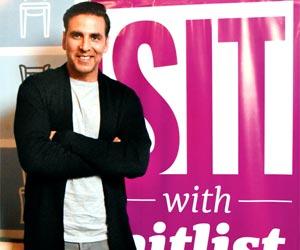
Akshay Kumar on Sit With Hitlist: Apparently I was crap, they removed me from Jo Jeeta Wahi Sikandar
 mid-day Exclusive: Now since this is part of a conversation series, I was trying to look at stuff that links you and Aamir. But, of course, you haven't done a film together. An interesting bit of trivia that I suspect audiences may not be aware of is that you, in fact, had auditioned for Aamir's cult classic Jo Jeeta Wahi Sikandar [1993], and it didn't eventually work out, is that true?
mid-day Exclusive: Now since this is part of a conversation series, I was trying to look at stuff that links you and Aamir. But, of course, you haven't done a film together. An interesting bit of trivia that I suspect audiences may not be aware of is that you, in fact, had auditioned for Aamir's cult classic Jo Jeeta Wahi Sikandar [1993], and it didn't eventually work out, is that true?
So, I went there. Apna screen test diya maine, for Deepak Tijori's role [Tijori played the young anti-hero in the school-campus rom-com]. And they didn't like it. And, apparently, I was crap, so they removed me. So, there you go!
Were you auditioning a lot [and perhaps getting rejected] in those years?
Yeah, I had auditioned with BR Chopra, Ravi Chopra, Raj Sippy, Pramod Chakravorty. I didn't have money to get my own portfolio shot, so I assisted photographer Jay Seth, on the condition that one day, he'd shoot and make my portfolio for me. I worked for him without any pay. Then there was the producer Salim Aftab, who'd made lots of films, including Loha, that I gave an audition for.
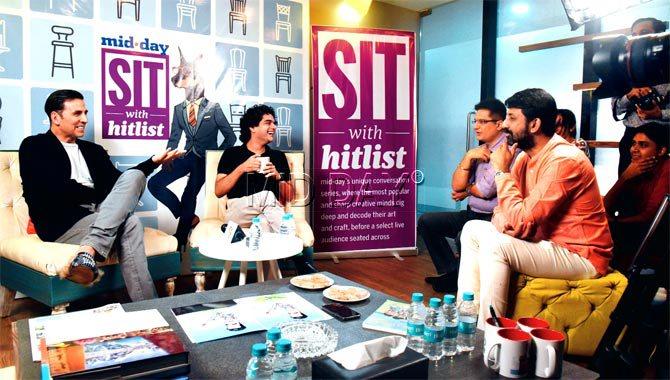
Akshay Kumar with mid-day team on Sit With Hitlist. Pics/ Nimesh Dave, Sayyed Sameer Abedi
So usually, in Mumbai, over 20,000 people come over every year with the expressed intention of working in films. And over the years...
Per year, no? In Bombay Central station itself, kariban 5,000 log roz utarte hai [get off everyday]. From the North, and the South, but mostly from the North. Of these, around 3,500 return, because nothing works out for them. That is the actual figure. And this is from one station.
So they step out of Bombay Central, and a lot of them head straight towards Lokhandwala, and adjoining areas...
Yes, Lokhandawa is the hub.
Most of them hang around in CCD [Café Coffee Day], Barista…. Was the scene very similar, when you were starting out? Was there like a CCD equivalent, where people would dress up, chill, discuss scripts...
Back then, there was nothing known as script. As for places, there was one called Bonbon. Have you heard of it? It's a shoe shop in Seven Bungalows [Andheri]. That's where everyone would gather. Aur, ikatthe bhi kaun hote thhe [and the ones who would gather would be] strugglers, with fight masters. So, they would sit there, talk about stuff. The fight masters would then take us to meet some producers, directors. Because every film had fights. I think, after every eight to ten scenes, there would be a fight. If you see films from those days, you'll realise how they used to be full of fights, and fights, and fights. Yaha tak ki, I've heard so many directors say, ki jab film ke screenplay mein dhalaan aaye [when the story peters down], toh fight dal do [put in a fight sequence], toh upar aa jayegi [the tempo will pick up]!
So you're saying these action directors were the casting agents, in their own ways, back then? That you look good, can fight well, let me take you to a producer/director?
Yes. For the entire day, Bon Bon would be our hub to meet up, because the fight masters were there.
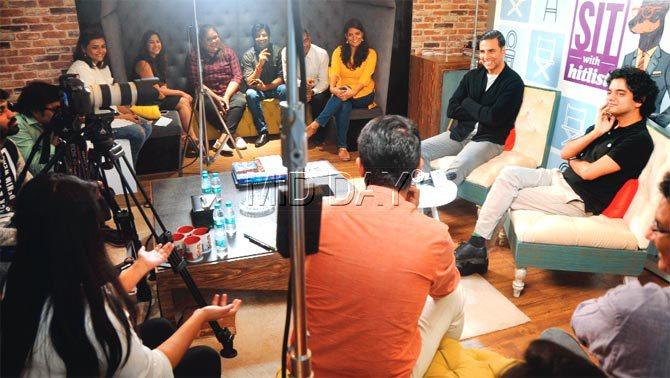
mid-day's exclusive in-depth conversation series started off with Aamir Khan. Akshay Kumar is a fine follow-up
Why outside a shoe store though?
Because uske baju mein [right next to it], kabab ki dukaan thi [there was a kabab shop]. All Punjabi fight masters used to go there, wahan kabab shabab khate the. But because the name of that kabab shop was not easy to pronounce, we used to refer to the place as Bonbon [for the shoe store next to it].
Another really fascinating thing I came across, and I'm not sure how many people know this, has to do with your name. A lot of conversations have happened around why you decided to take up Akshay Kumar [his real name is Rajeev Bhatia]. There was a [little known] Mahesh Bhatt film called Aaj, that you worked in, where you were supposed to be a stunt-person...
Martial arts teacher.
And when you actually saw the film, your role had been snipped to about seven seconds. Is that correct?
No, it was always that long. I had shot for seven seconds!
And then, you realised that the hero of that film is called Akshay. So you started to call yourself Akshay as well. Is that really the story?
Yes. That is a true story. Kumar Gaurav was the hero in that film. He was called Akshay. And, I don't know why, it's not that I thought my name was bad. Rajeev is a very good name. Pata nahi, dimag mein koi chah aa jati hai [something just interests you in your head]. And I just wanted to go, and change my name, and I went to the court in Bandra East and did it. I have a full certificate as proof [of my name-change].
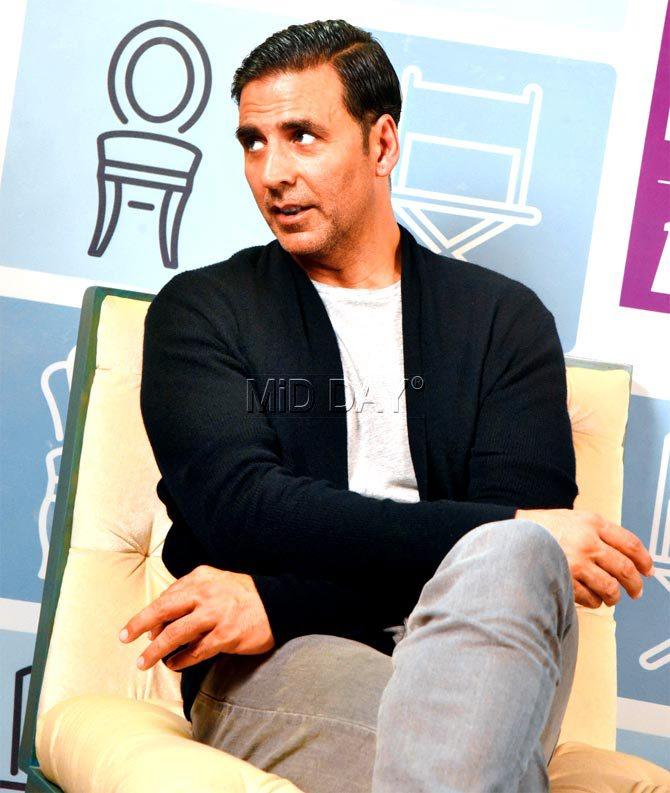
Akshay Kumar decodes Bollywood's box-office secrets on Sit With Hitlist
And on one fine day, you decided to have a visiting card with that name.
Yes, a yellow and white coloured card.
Do you have the card with you?
I'm sure it's lying around somewhere. It was yellow and white in colour, I still remember that. I put my [new] name on it, my address, baaki toh kuch ttha hi nahi [there was nothing else to put anyway]. I just wrote, black belt, under it. That's it.
And your life changed on that day!
Actually there's a long story behind this. You want me to say it?
Absolutely.
So, I woke up one morning to start my workout. At six in the evening that day, I was meant to go to Bangalore for a modelling assignment that I'd got. At 5.10 am, I got a call from the airport. The [modelling] agency guy asked me where I was. I said I was home. And then he blasted me, over how unprofessional I was. He said, "You will never succeed in life, I can guarantee you." I asked, "What happened?" And then I realised, the flight I had thought was for 6 pm, was actually for 6 am. I was actually in tears telling him, "Yaar, mein bhag ke, motorcycle pe abhi aata hoon [I can just rush in now]." Unfortunately, they didn't agree. Obviously, they were also right. They had to catch a flight as well. Ussi din, mera card bhi aa gaya chap ke [That's the day my visiting cards arrived from the printing press]. I was very low. My father had gone to work. I was talking to my mother, who said, as every mother says in their own language, "Puttar koi baat bahi. Jo honda hai, Rab theek karta hai [Whatever happens, happens for the good]." That line, I've heard so many times from my mother. So, I went to Natraj studio that day, where I met [filmmaker] Pramod Chakravorty's company's make-up man. He asked me, "Hero banna hai?" I said, "Haan yaar, banna hai [Yes, I want to be a hero]. He said, "Photo hai [You have pictures]?" At that time, we used to travel with such big photographs, in a huge album. Because directors, and producers, would not want to see a small picture. I don't know what they wanted to see - pores in your skin, or what. But they wanted to see everything closely. So, he took that album inside the office, Pramod Chakravorty saw it. I was called in. Much to my surprise, he gave me my first cheque, signed me up for three films, immediately. Right away. He gave me a cheque of R5000, for the first film, R50,000, for second film, and the third cheque had R1.5 lakh on it. The exact time he gave me those cheques was 6 o'clock in the evening. It would have been a disaster, if I would have gone to Bangalore. Today, I would be a retired model somewhere. So yes, whatever happens is for the good.
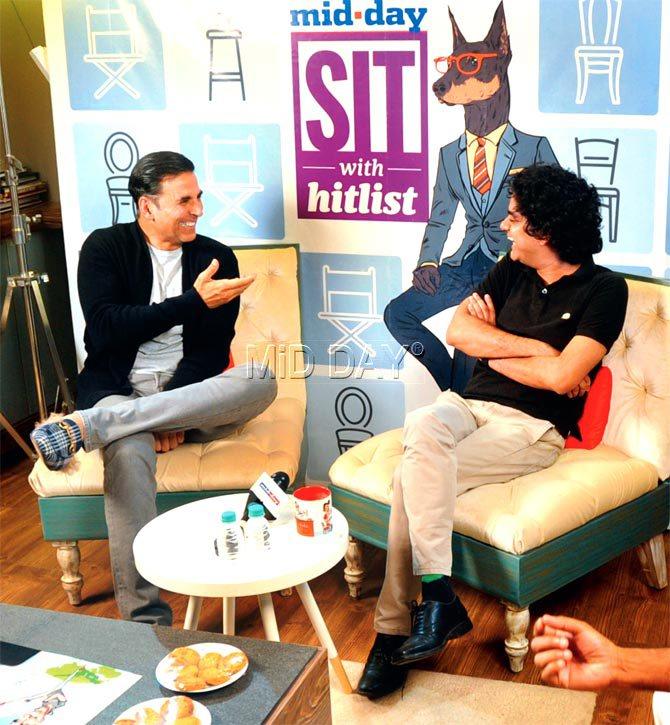
Akshay Kumar reveals the science behind scoring multiple successes in a year on Sit With Hitlist
So you didn't go to Bon Bon the next day?
I did.
To tell everyone, boss, I got my break?
You know how it is. Humare dimag mein yeh bhi ek rehta hai na, ki jab tak film shuru nahi hoti, tab tak kya pata [You're never sure until the film actually rolls]. So many slips happen so often. You just never know. When Dada [Chakravorty] started taking care of me, I became his
family.
So that make-up man is still your make-up person?
Yes, he's still there. Since I entered the industry, my driver, spot-boy, everybody has been the same.
I'm assuming the film you got that day was Deedar, which was also supposed to be Karisma Kapoor's debut?
Actually, Nagma had given the screen test first. Then Karisma did, and Karisma got selected.
This would have been your first film on screen, but it wasn't. And it was a romantic film?
Yes.
So you would have started out as a romantic hero, rather than the 'action star' that you eventually became.
But it [Deedar] had lots of fights too!
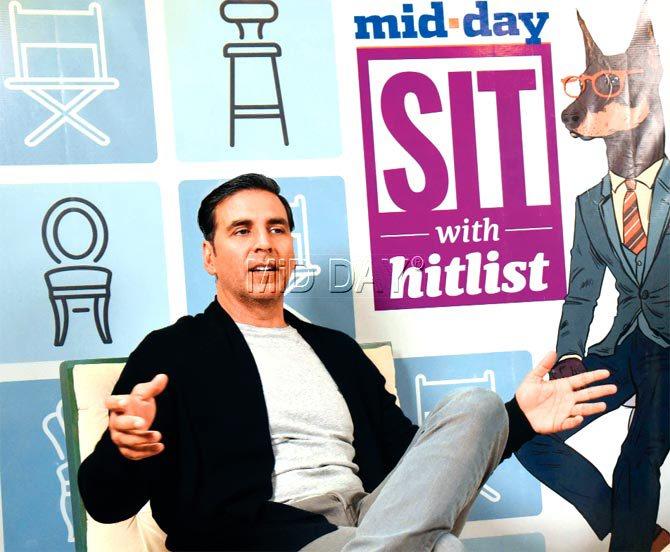
Akshay Kumar says, "Since I entered the industry, my driver, spot-boy, everybody has been the same"
The persona that stuck with you was that of 'Khiladi', which is from your third or fourth movie onwards. Your name itself became Khiladi. Correct me if I'm wrong, one of the tests for old-world stardom in Indian movies, is when the actor acquires a sobriquet: for instance, Amitabh Bachchan is Shahenshah, Shah Rukh is Badshah, or King Khan… After Khiladi, in particular, was there a moment when you finally realised or told yourself, "Boss, I'm finally a star"?
I have this habit of listening to lots of people's stories, and learning from their experiences. Like, I love hearing about what happened with Rajendra Kumar, or Sunil Dutt saab, or Rajesh Khanna, or some producer, and I've learnt from their experiences. And the fact remains, there's nothing called a star. Kyunki aaj hai, kal nahi [It's there today, gone tomorrow]. Yeh mein bahut jaldi seekh gaya [I learnt this quite early on]. So I never took the idea of stardom very seriously. Sure, they call me Khiladi viladi, and they still do. For the last 15 years in the industry, I haven't made a 'Khiladi' film, yet if I step out, people say, "Aye Khiladi!" Even if I do 50 more films, woh naam hatega hi nahi [that name won't disappear]. But, I have never taken the word 'star' seriously, because I'm very scared that this is all going to go away. Without taking names, I have even heard stories of people going mental, when this star [syndrome] has been taken seriously, and things have started falling apart. Because this is a very deadly industry. Kabhi bhi gira sakti hai [You can fall any minute]. Kuch bhi ho sakta hai [Anything can happen].
Any other stories you might want to tell in this regard, even if without taking names?
Actually, I've learnt a lot from Danny Denzongpa. He's the one guy I would always like my life to be like. He has never taken his stardom seriously. He has his own very straight and simple life. He has his small beer company, where he gets his money from.
Dansberg, yes. You don't drink, but it's a superb beer though!
Yeah, I don't drink, but I know what you mean. Similarly I would also like to have a small company, so money keeps coming in. Then for three months in the summers, he [Danny] doesn't work. In the winters, if there's work, he'll go there. For two months, he goes alone, taking his flute, and he's singing, swimming in lakes! He really spends a life, and he has a great family life too - a man without any stress. I look at him, and say I want to have a life like him. So I follow him, and try to ape him. I'm sure you didn't expect Danny Denzongpa's name.
As your idol?
Well, only for the way he leads his life.
Sure, not as a professional, because very few people have been as competitive as you. I mean you take your holidays, but you make sure that you do four films a year.
Well, I don't make sure. It is not science. I fail to understand why people think of four films as a big deal. It's 38 days, into 4, that's 152 days in a year, give it 10 days each for the film's promotional activities, the rest of the days are yours, ghumo firo! (chill).
The other thing about highs and lows, very few have seen that as much as you - strings of hits followed by string of flops - and you've done so many films that you've probably lost count yourself...
No, I count them. It's 131.
Does that include Aaj?
Yes.
Because, Aaj doesn't feature much online...
I actually have another film, even before Aaj, called Harjayi.
What did you do in that movie?
I'm throwing flowers at Randhir Kapoor, he's getting married! (Audience laughs)
So when you've done that many movies, clearly by now, you have a sense of chalegi ya nahin [will it work or not]?
No.
Not at all?
Kisika baap nahi bata sakta! I challenge anybody who can say, yeh chalegi [this will work].
So are you still stunned by arrey, yeh, chal gayi [wow, that worked]? Or the other way round?
I can only say that this film will make a name for itself. But I can't predict what kind of business it'll do. For example, with Toilet [Ek Prem Katha], I knew people are going to say that we've made a good film. But that it would make R130 to 132 crore was shocking for me.
And 2017 has been your year again: two back-to-back massive hits.
Things have been very good. It's been like this from the beginning of my career. Flop chal raha hai toh chal hi raha hai. 14 flops ek saath marta hoon! [If films are flopping, then I hit 14 flops in a row!]. And if it's hits, toh 12 hits mari hai ek saath [then I've scored 12 hits in a row!] Right now, the number is six [hits in succession]. Between 2010 and '12, I had delivered six flops together.
So you're saying it's purely luck of the draw then. By now I'm certain you've the inherent instinct to figure the business out; I mean that's how you budget movies, isn't it?
Okay, chalo mein aapki baat maan leta hoon [Let me agree with you then]. Golmaal [Again] released. I bet R2 lakh that the film will hit R200-crore mark. And that number worked.
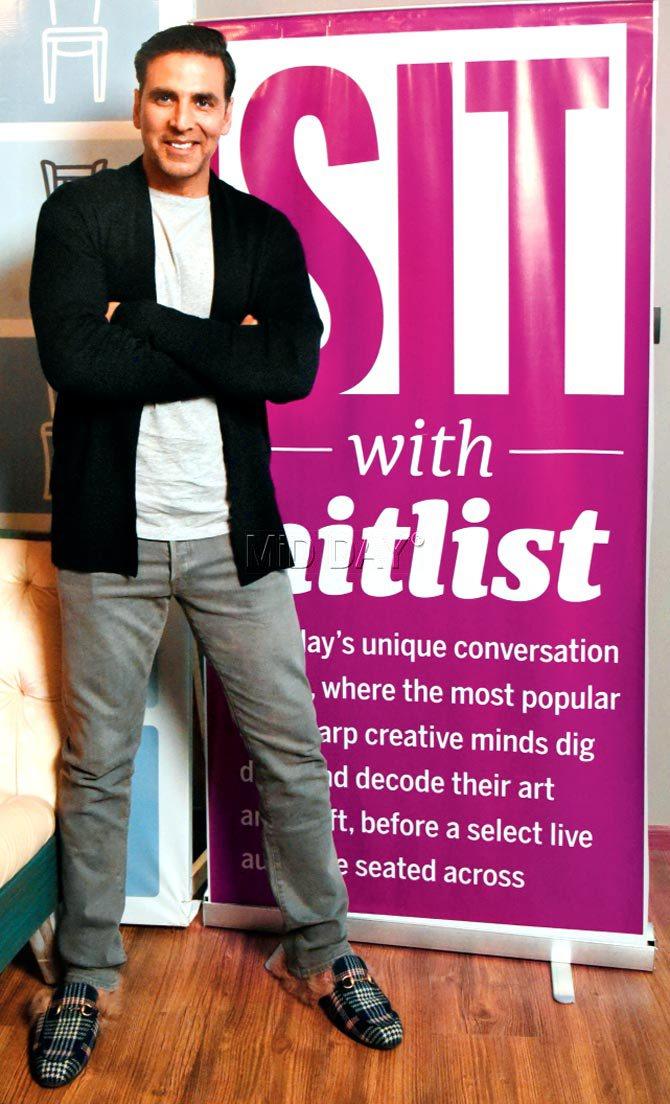
Akshay Kumar says, "Earlier I used to work in films for money. But, now I don't."
Who was the bet with? Ajay (Devgn)?
No, I'm not going to tell you; someone else.
That's another interesting relationship you have with Ajay Devgn. You were apparently chosen to star in his first [Phool Aur Kaante, 1991]. Is that true?
Yes, I was in Phool Aur Kaante. I sat in on the [music] sessions, with Nadeem-Shravan at Sunny Super Sound [recording studio]. Those days, there used to be 30-40 violin guys in every song, a separate orchestra. Ab toh, we finish off everything in an instant. So at night, I was readying my ice box. You had to do it on your own in those days - paani dalna, barf dalna [placing water, ice]. So I was getting ready for the first day's shoot. And then I get a call, ki bhaiya aap mat aana. Koi aur aa raha hai [You don't need to come for the shoot, someone else is].
Nepotism?
No. But around the same time, a few days later, I met Abbas-Mustan at Juhu Centaur. And got Khiladi [1992].
Now another thing you'd maintained throughout in your career, is that you will never turn into a producer, that you only want to remain an actor. But you first produced Waqt [2005], the earnings of which, if I'm not mistaken, you donated to a cancer hospital in Canada. It seemed like a one-off call. But now you're one of those most active producers. What led to that change?
See, it became very difficult for me after a point. Now a producer comes in and says, "Bhaiya, mein produce karna chahta hoon, aap kitna paise lete hain [How much do you charge]? I don't know what to charge. Because, actually, nobody can come to know what to charge. The best way then would be that I make my own film. And I don't charge anything. When the film releases, I take whatever the earnings are, the whole thing.
You take the whole thing?
Yes, because I'm producing it. Unless, agar aap paise laga rahe ho [you're putting in money], I have to pay you. I make most of my films at a budget of R20-30 crore, say. That return is guaranteed. Beyond that, if the earnings are R40, 50, or 60 crore, good. And if it totally doesn't work, and makes R10 crore, even then I have not caused a loss to anyone. It's a very simple. Obviously a newcomer can't do this. You have to be in this industry for quite a while. But, this is my calculation behind producing films - the fact that I cannot quote a price on myself, to any producer. Because I don't know how much the film will make. And I don't know what is going to happen - sometimes satellite rates go up, digital rights numbers go down, music works, or Bhushanji [T-Series' Bhushan Kumar] says ki nahi chali [didn't work]. Nobody knows what is happening. There is no certainty to anything. So, why not take the blame on myself? And if I earn, I earn. If not, I lose. And obviously, there's no chance of losing, because that much [of investment], you can always earn [recover].
Are you good with money, otherwise?
I'm very good with money. My father was an accountant. I can calculate money very fast.
Does money interest you a lot?
No. To a certain extent, yes. Earlier I used to work in films for money. But, now I don't - I want to make films, which make a difference to society. That's why you'll see my choices of films have changed. Yes, when I entered the industry, it was a pure and simple thing - paisa kamao, ghar jaao [earn and leave] - I just wanted R10 crore in my bank. Ab, woh calculation bandh ho gaya. That money wire in my head has been cut off. Now my calculation is, what next.
That's such a huge change from how you used to be-from your subjects in films, to your approach to movies itself.
But then that wire got cut!
When that wire was there, what did you love about money most? Was there ever a moment when you bought something and that felt like worth earning for?
I had not seen much money since childhood. So there was certainly an attraction towards it. But when I bought my house, that felt good. It was later that I realised that it was the same place where I'd done a photo shoot, and the chowkidaar had thrown me out! It's just a coincidence that I bought that house. Not exactly a scene from Anitabh Bachchan's Deewar [1975]! I still have a photograph of me lying on the ledge, and it's the same place where I live now. I have memories of coming to that beach with my parents. We would spend family time together.
It seemed to me that [your wife] Twinkle [Khanna] also had a role to play in the change in your film choices. She happened to be in the room while I was having this conversation with you recently. She agreed and said, in jest, that she keeps whispering in your ears while you sleep: "Do good films. Win awards." You said that you whisper back into her ears, "Mela, Mela..."
I also tell her about Kuch Kuch Hota Hai [1998]. Even that was offered to her. She read the script, and she didn't understand it. Eventually, Rani [Mukerji] did that role. She still tells Rani, "Teri zindagi maine banayi [I made your life]." She'd actually thrown the script, and called it sh*t!
As a couple, you share fabulous chemistry in public. But you guys seem very different from each other otherwise. She is a popular writer, very vocal about her opinions. You are extremely diplomatic. Are you much of a reader?
I don't read anything, except my agreements. I am a movie person. I watch every film, and almost every day. Anything on TV catches my attention. Just the other day, I was watching a Malayalam film, with no subtitles. I wasn't understanding anything. But mentally, I was weaving my own story of what's playing, based on the visuals. A lot of the times we make movies, by looking at movies.
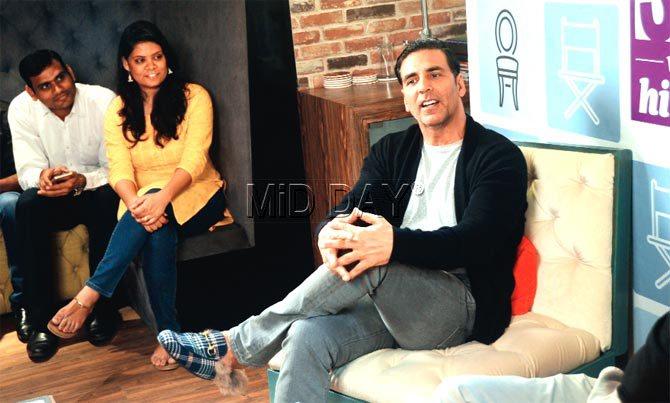
Akshay Kumar decoded in an exclusive chat on Sit With Hitlist
Do you usually also look for material to remake?
I don't remake films, I remake scenes. Earlier in Hindi films, we would copy a lot. Things became really strict over time. Earlier, copyright meant right to copy. But thankfully, now we've a lot of original scripts to choose from. With studios coming in, things have fallen in place. People are working towards original screenplays. When you watch new movies, you can feel this change in cinema - Vicky Donor [2012], Shubh Mangal Savdhan [2017]… Earlier, who would think of making a film on sperm donation?
That's also the mode you've picked: mainstream, entertaining movies, slightly high-pitched, with a strong message [Jolly LLB 2, Toilet: Ek Prem Katha].
You have to do that.
While you're extremely diplomatic on political affairs, I was watching an interview of yours, where you've said that you wouldn't mind being a sports or health minister. Really?
I know these two areas very well. I don't want to do politics, for the sake of politics. I know what a sportsman thinks. I know I can do something about it. Even if I am given a stadium, I know I can change things. All my life I have been into sport. I might not be that educated, but sports has provided me education all along.
So far as movies are concerned, the one thing that you can certainly take credit for is bringing about change in the lives of stuntmen. Awara Pagal Deewana [2002] was the first movie to introduce stunts, using cables. Back in the day stuntmen used to die, lose limbs during jumps. There was hardly any safety net from an insurance point of view either.
I am happy to say that every fighter now has insurance. Hindi films' stuntmen are the only insured people. This practise has yet to reach Tamil and Telugu industries. Those men also need to be insured. I remember, once I was wearing my knee pads on the sets, that I had got from Bangkok. The stunt-master came up to me and said, "Kya kar raha hai, beta. Chand pe jaa raha hai. Mera bhi ghutna toota hai, theek hai. [What're you doing, son? Are you going to the moon? Even I've broken my knee, it's okay!]." There was such lack of knowledge.
Have you seen a major mishap happen in front of your eyes?
I have seen someone die. I can never forget that. He was a young boy, doing a car stunt. He waved out at all of us. And then the crash happened. We all went running. But by the time we got him out, he had snapped his neck. People don't understand that there is a lot of physics behind stunts. You've to understand it better. Suppose, if someone has to jump from a highrise or even from a chopper, what you think is the middle point, where you have to land, is actually not the mid-point. You have to take into consideration the airspeed which will shift you from it. I remember someone had to jump from a height, and land on boxes, and he fell out of it. People blamed me for it, said he was trying to copy me. People need to understand that every stunt - be it jumps, or those involving fire, skidding on a motorcycle - can be calculated. Stuntmen don't take proper care. They've started to of late. Earlier, we used to lose our men, left, right, centre.
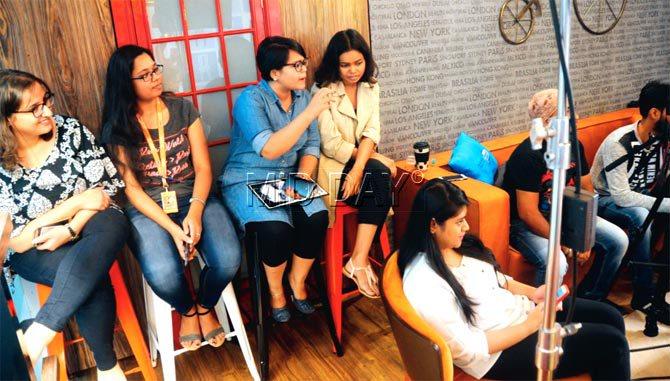
Akshay Kumar was the second guest at mid-day's exclusive conversation series Sit With Hitlist
Another area that you've actively worked on is self-defense for women. I was quite stunned to learn that this year, you had 21,000 girls graduate from your school.
Well, there was a recent case as well. A guy tried to molest one of the girls trained from my school. Forget resisting the molestation, she was so powerful that she beat him black and blue. He is in jail now. It's not about learning martial arts. Women have to understand that they should be able to combat blows. What happens when someone holds a girl's hands, she freezes. She can't believe that someone has caught her like this [inappropriately]. She doesn't scream, move or shriek. That is when a man takes advantage of her. I am trying to teach them how to be more confident in real life, besides being able to get out of an unfortunate situation. I teach them that they have to scream. I never have them come to the school in track pants. If people go to work in saree, they should come to learn in a saree. When someone attacks, you won't say, "Ruko track pant pehen ke aane do [Wait, let me wear my track pants]." They practice in heels, shoes everything. We have all kinds of students -from CEOs, to maids -training, free of cost. They come, enjoy the classes, and win medals. My farewell gift to them is a keychain with a whistle on it. When a girl whistles, the guy withdraws, and gets shocked. It scares him. It's an Israeli tactic.
Final question, and coming back to films, and actually how we began this conversation, with the Aamir Khan connection. Your next huge film is Shankar's 2.0. Because Rajinikanth wasn't well at a point, he had called Aamir up to check if he might want to do his role in 2.0. And Aamir said this was the most kick-ass script he'd read in the longest time, and that it would to be the biggest hit of the year. Except, he couldn't imagine himself playing that part, he could only see Rajini, when he closed his eyes. That great?
Yes, it is something very different. As I always say, Shankar is not a director, he's a scientist. He discovers things. Once you watch the movie, you will wonder for a while, "Yeh hua kya?" The topic is great. And it's a superhero film, where you get emotional as well. I don't know how Shankar does it. I have no idea how he wrote it.
And this is one of those films that can actually go across India, Rajini, you - South, North?
Yes. It has the capacity to travel even outside India, in a big way.
(Excerpts of the conversation transcribed by Sonia Lulla, Mohar Basu and Sonil Dedhia)
 Subscribe today by clicking the link and stay updated with the latest news!" Click here!
Subscribe today by clicking the link and stay updated with the latest news!" Click here!









